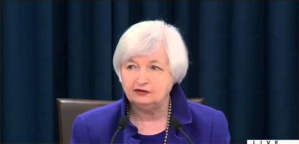Dynamics of shares of energy companies led to the fall of the index MSCI Emerging Markets, and Bloomberg Commodity Index fell to a 16-year low due to falling oil prices.
The dollar index on Wednesday reached the highest level in 10 years, after Yellen said that the world's largest economy is ready for higher borrowing costs.
Recall that the national currencies of developing countries fell to a record low. The fall’s leader is the Indonesian Rupiah. South Korean won depreciates the sixth day in a row, and is the longest decline since September.
Almost zero borrowing costs of the Federal Reserve supported demand for riskier assets and growth. Change of the situation is expected to cause investors to re-invest in the dollar.
Investors are focusing on the potential divergence of monetary policy. It happened after Yellen’s speech on Thursday to lawmakers in Congress, and the ECB’s announce on future reduction of deposit rates and expansion of the asset purchase program.
Signs of discord among oil-producing countries on the supply reduction complement uncertainty in world markets and pressure on the energy markets shares.
"The Fed adheres to the rate hikes course in December - said Sim Moh Siong, a currency strategist at Bank of Singapore Ltd. - There is little likelihood that the ECB may exceed expectations, but the market includes price with consideration of the significant mitigation."
Recall that the price of oil has fallen by almost 40%, after OPEC decided not to reduce quotas in November last year to protect their market share.
Asian indices are not dropping altogether: Hang Seng China Enterprises index could not stand the pressure and fell the first time in three days, while the Shanghai Composite is rising a fourth day in a row, due to the fact that the Chinese government has promised to strengthen measures to support the economy.
South Korea's Kospi fell 0.9% to a two-week low against the background of the global funds’ money withdrawal.
The index of emerging market currencies fell by 0.2% over the past two days, and it is only slightly above the record low that was reached on 28 September.
Indonesian rupiah fell 0.4% against the dollar and reached its lowest level since October 8, amid falling prices for export commodities such as coal and metals. Indian rupee, the Polish zloty, the Lion of Bulgaria and Romania's leu fell by 0.2%. Vaughn fell 0.1% after easing 0.5%.
source: bloomberg.com
The dollar index on Wednesday reached the highest level in 10 years, after Yellen said that the world's largest economy is ready for higher borrowing costs.
Recall that the national currencies of developing countries fell to a record low. The fall’s leader is the Indonesian Rupiah. South Korean won depreciates the sixth day in a row, and is the longest decline since September.
Almost zero borrowing costs of the Federal Reserve supported demand for riskier assets and growth. Change of the situation is expected to cause investors to re-invest in the dollar.
Investors are focusing on the potential divergence of monetary policy. It happened after Yellen’s speech on Thursday to lawmakers in Congress, and the ECB’s announce on future reduction of deposit rates and expansion of the asset purchase program.
Signs of discord among oil-producing countries on the supply reduction complement uncertainty in world markets and pressure on the energy markets shares.
"The Fed adheres to the rate hikes course in December - said Sim Moh Siong, a currency strategist at Bank of Singapore Ltd. - There is little likelihood that the ECB may exceed expectations, but the market includes price with consideration of the significant mitigation."
Recall that the price of oil has fallen by almost 40%, after OPEC decided not to reduce quotas in November last year to protect their market share.
Asian indices are not dropping altogether: Hang Seng China Enterprises index could not stand the pressure and fell the first time in three days, while the Shanghai Composite is rising a fourth day in a row, due to the fact that the Chinese government has promised to strengthen measures to support the economy.
South Korea's Kospi fell 0.9% to a two-week low against the background of the global funds’ money withdrawal.
The index of emerging market currencies fell by 0.2% over the past two days, and it is only slightly above the record low that was reached on 28 September.
Indonesian rupiah fell 0.4% against the dollar and reached its lowest level since October 8, amid falling prices for export commodities such as coal and metals. Indian rupee, the Polish zloty, the Lion of Bulgaria and Romania's leu fell by 0.2%. Vaughn fell 0.1% after easing 0.5%.
source: bloomberg.com






